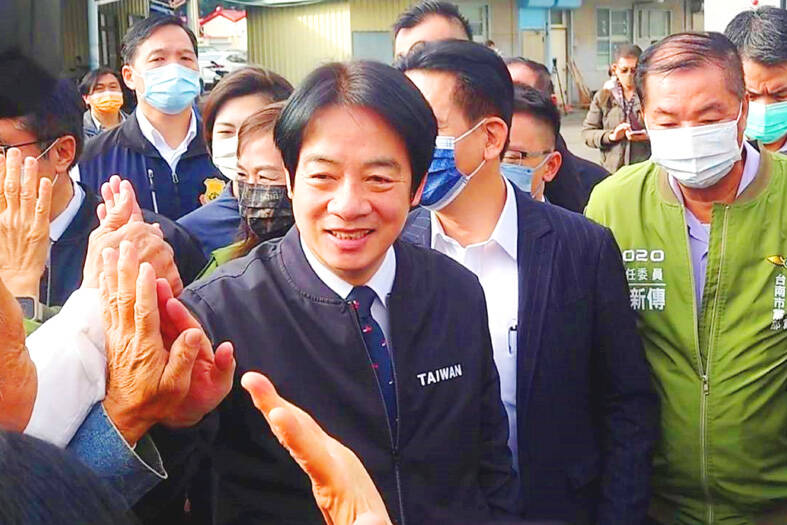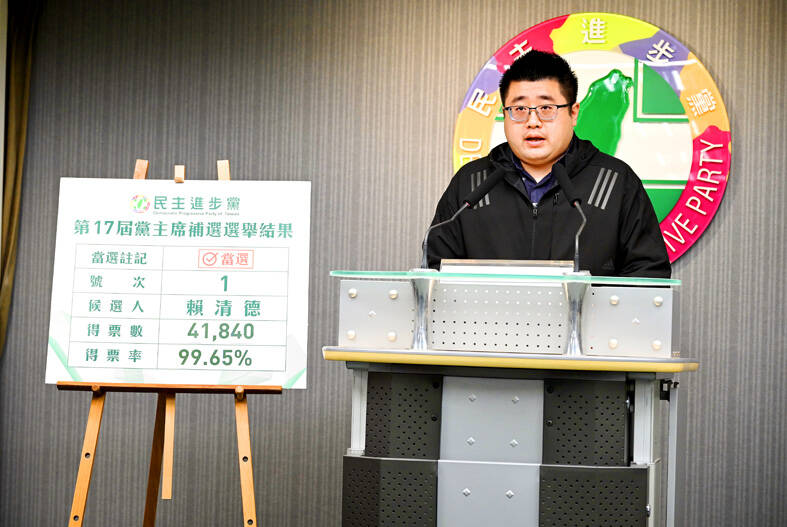Vice President William Lai (賴清德) yesterday pledged to unite the Democratic Progressive Party (DPP) and to “polish its image as an honest, diligent and grassroots party,” after he was elected its new chairman.
The election was held after President Tsai Ing-wen (蔡英文) stepped down as DPP chairperson following the party’s bruising defeats in the local elections on Nov. 26 last year.
Lai, who ran unopposed, was elected with 99.65 percent of the votes, DPP interim secretary-general Sidney Lin (林鶴明) told a news conference last night.

Photo: CNA
Lai won 41,840 votes and the turnout rate was 17.59 percent, slightly higher than the 16.9 percent in the previous chairperson election in 2019, Lin said.
The DPP’s Central Standing Committee is to confirm the result on Wednesday, after which Lai is to take over the post from Kaohsiung Mayor Chen Chi-mai (陳其邁), who was appointed by the committee as the party’s interim chairman.
Lai’s term as DPP chairman is to end on May 19 next year.

Photo: Lo Pei-de, Taipei Times
After Lin’s announcement, Lai said in a statement that he would “go all-in to undertake the mission” entrusted to him.
His goals are to win back people’s trust, unite the party and lead the DPP to honor its slogan — “honesty, diligence and love for the country,” he said.
The DPP brought about a democratic revolution in Taiwan, Lai said, adding that its mission is to safeguard the nation and promote democracy, peace and prosperity.
He thanked those party members who cast their ballots, adding that every vote and all of their advice would contribute to the “drive for the DPP to revive.”
Chen thanked Lai for shouldering the challenges the DPP is facing and said he hopes the party can regroup soon to guard the country.
Chinese Nationalist Party (KMT) Cultural and Communications Committee director Hung Meng-kai (洪孟楷) congratulated Lai and said he hopes the KMT and DPP can have a healthy competition and value the public’s opinions.
Lai is widely expected to run for president next year, but the 63-year-old chairman-elect first has to take on some major challenges facing the party.
These include bringing the DPP back on track after local election defeats, restoring unity in an increasingly divided party and trying to win back the support of younger voters.
Ahead of the chairperson election, Lai held his final political platform presentation on Saturday night in Tainan.
Party members who spoke at the event expressed their hopes that Lai would crack down on allegedly illicit finances and organized crime connections within the DPP, saying the issues are causing great damage to the party.
Those who act against party discipline should be punished without mercy, they said, referring to allegations of vote-buying in the Tainan City Council speaker election last month.
In response, Lai led DPP Tainan Mayor Huang Wei-che (黃偉哲), as well as Tainan city councilors and six DPP legislators representing constituencies in the city, in a bow to apologize to party members.
Party members told him they had not given up on the DPP, Lai said, adding that democracy is the goal that the party pursues.
He asked party members holding government positions not to forget the aspirations they had when first joining the party, adding that they should not put personal interests ahead of the interests of the country.
Additional reporting by Wang Shu-hsiu, Hung Jui-chin, Lin Liang-sheng and CNA

DAREDEVIL: Honnold said it had always been a dream of his to climb Taipei 101, while a Netflix producer said the skyscraper was ‘a real icon of this country’ US climber Alex Honnold yesterday took on Taiwan’s tallest building, becoming the first person to scale Taipei 101 without a rope, harness or safety net. Hundreds of spectators gathered at the base of the 101-story skyscraper to watch Honnold, 40, embark on his daredevil feat, which was also broadcast live on Netflix. Dressed in a red T-shirt and yellow custom-made climbing shoes, Honnold swiftly moved up the southeast face of the glass and steel building. At one point, he stepped onto a platform midway up to wave down at fans and onlookers who were taking photos. People watching from inside

A Vietnamese migrant worker yesterday won NT$12 million (US$379,627) on a Lunar New Year scratch card in Kaohsiung as part of Taiwan Lottery Co’s (台灣彩券) “NT$12 Million Grand Fortune” (1200萬大吉利) game. The man was the first top-prize winner of the new game launched on Jan. 6 to mark the Lunar New Year. Three Vietnamese migrant workers visited a Taiwan Lottery shop on Xinyue Street in Kaohsiung’s Gangshan District (崗山), a store representative said. The player bought multiple tickets and, after winning nothing, held the final lottery ticket in one hand and rubbed the store’s statue of the Maitreya Buddha’s belly with the other,

‘NATO-PLUS’: ‘Our strategic partners in the Indo-Pacific are facing increasing aggression by the Chinese Communist Party,’ US Representative Rob Wittman said The US House of Representatives on Monday released its version of the Consolidated Appropriations Act, which includes US$1.15 billion to support security cooperation with Taiwan. The omnibus act, covering US$1.2 trillion of spending, allocates US$1 billion for the Taiwan Security Cooperation Initiative, as well as US$150 million for the replacement of defense articles and reimbursement of defense services provided to Taiwan. The fund allocations were based on the US National Defense Authorization Act for fiscal 2026 that was passed by the US Congress last month and authorized up to US$1 billion to the US Defense Security Cooperation Agency in support of the

‘COMMITTED TO DETERRENCE’: Washington would stand by its allies, but it can only help as much as countries help themselves, Raymond Greene said The US is committed to deterrence in the first island chain, but it should not bear the burden alone, as “freedom is not free,” American Institute in Taiwan Director Raymond Greene said in a speech at the Institute for National Defense and Security Research’s “Strengthening Resilience: Defense as the Engine of Development” seminar in Taipei yesterday. In the speech, titled “Investing Together and a Secure and Prosperous Future,” Greene highlighted the contributions of US President Donald Trump’s administration to Taiwan’s defense efforts, including the establishment of supply chains for drones and autonomous systems, offers of security assistance and the expansion of